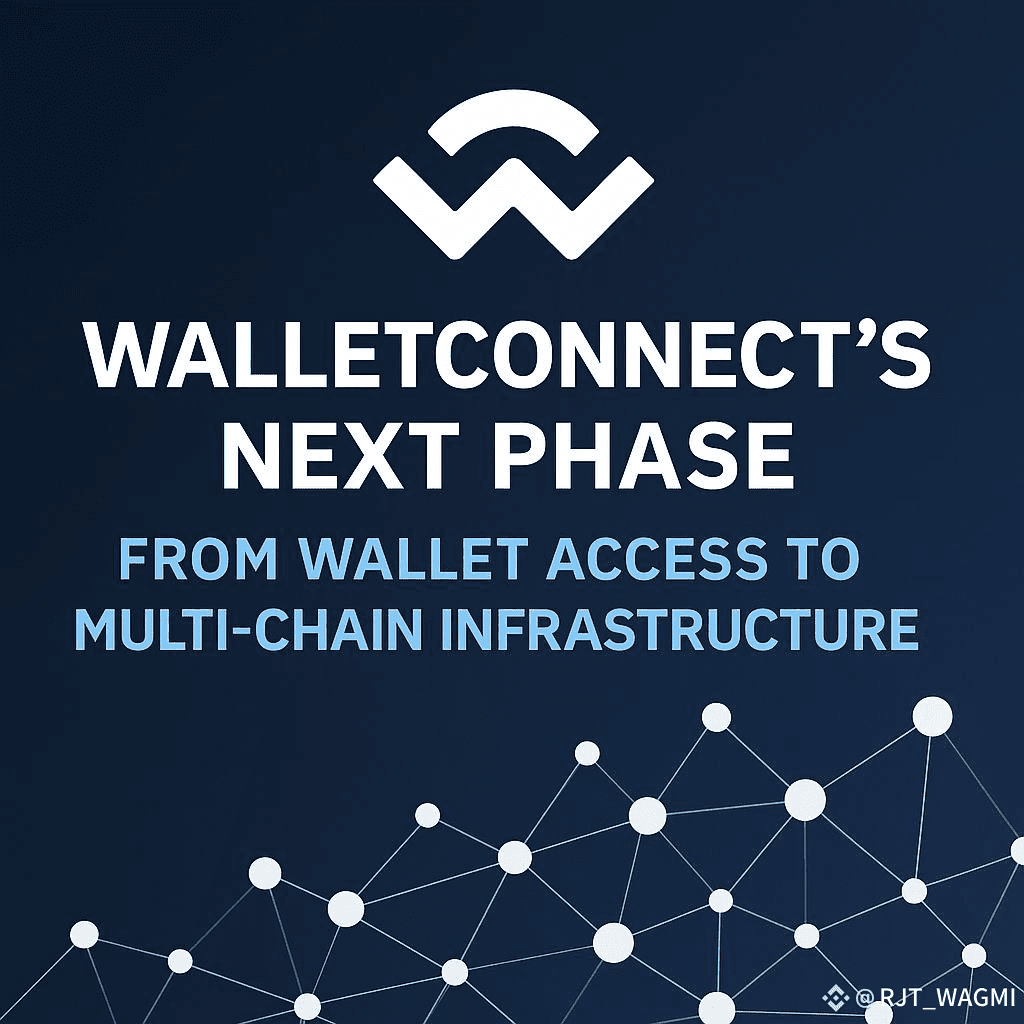In the story of Web3, few tools have been as quietly influential as WalletConnect. What began as a simple protocol to link wallets with decentralized applications (dApps) is now transforming into a multi-chain infrastructure layer powering identity, security, and interoperability across the blockchain universe.
The progression from WalletConnect v1 to v2 wasn’t just an upgrade — it was a declaration: WalletConnect is no longer just about connecting wallets. It’s becoming the trustless communication backbone of the multi-chain era.

From v1 to v2: Scaling the Wallet Layer:
The shift to WalletConnect v2 introduced several groundbreaking features:
Multi-session support → Users can maintain simultaneous connections with multiple dApps.
Cross-chain communication → A single SDK handles wallet integrations across Ethereum, Solana, Cosmos, BNB Chain, and more.
Device syncing → Seamless access across mobile, browser, and desktop environments.
For developers, this means one integration unlocks an entire multi-chain audience. For users, it means a more fluid experience where moving between blockchains feels less like switching countries and more like walking down the same street.
Web3Modal 3.0: Simplifying Access:
On the user-facing side, Web3Modal has become the crown jewel of WalletConnect’s ecosystem. With the 3.0 update, it now integrates:
Native WalletConnect v2 compatibility → Full power of the upgraded protocol.
EIP-6963 support → Standardized wallet discovery for faster, cleaner access.
This matters because wallet connection is often the first interaction new users have with Web3. A bad experience means drop-off. A smooth, instant connection means adoption. It’s no surprise that NFT platforms, DeFi apps, and exchanges are increasingly making Web3Modal their default integration choice.
Security as Infrastructure:
As Web3 scales, connection isn’t enough — trust and resilience are non-negotiable. WalletConnect is tackling this head-on with:
Decentralized Key Negotiation Network → Reduces reliance on centralized servers, making communications resistant to censorship or outages.
Open Standards Integration → Using OpenRPC and Decentralized Identifiers (DIDs) for standardized, trustless interactions.
In this model, WalletConnect isn’t just a wallet connector — it’s becoming a secure communication hub that guarantees reliability even in adversarial conditions.
Why This Evolution Matters:
The significance of WalletConnect’s evolution lies in its layered value proposition:
For Developers → A universal SDK to integrate wallets once, deploy everywhere.
For Users → A seamless, familiar experience across chains and devices.
For Web3 Infrastructure → A decentralized communication backbone that strengthens the ecosystem’s resilience.
This positions WalletConnect as more than middleware. It’s becoming the wallet layer of Web3’s multi-chain operating system.
The Bigger Picture: WalletConnect as Multi-Chain Glue:
Web3’s future won’t be single-chain — it will be multi-chain by default. Assets will flow across ecosystems, identity will span multiple blockchains, and applications will demand frictionless cross-chain UX.
WalletConnect is positioning itself as the glue that binds these worlds together:
Identity Layer → Users can prove ownership across chains with a unified interface.
Communication Layer → Decentralized negotiation ensures dApps and wallets can talk trustlessly.
Access Layer → Web3Modal becomes the onboarding front door for millions.
This trajectory mirrors how protocols like TCP/IP shaped the internet — invisible to most users, yet essential for everything that works on top.
Final Thoughts:
WalletConnect’s evolution from v1 → v2, and now toward decentralized communication infrastructure, marks one of the most important — but underappreciated — transitions in Web3.
It started as a connector.
It grew into a multi-chain SDK.
It is now becoming a core trustless infrastructure layer for the decentralized internet.
As adoption spreads, WalletConnect could emerge as the default interoperability protocol of Web3,
$WCT @WalletConnect #WalletConnect

